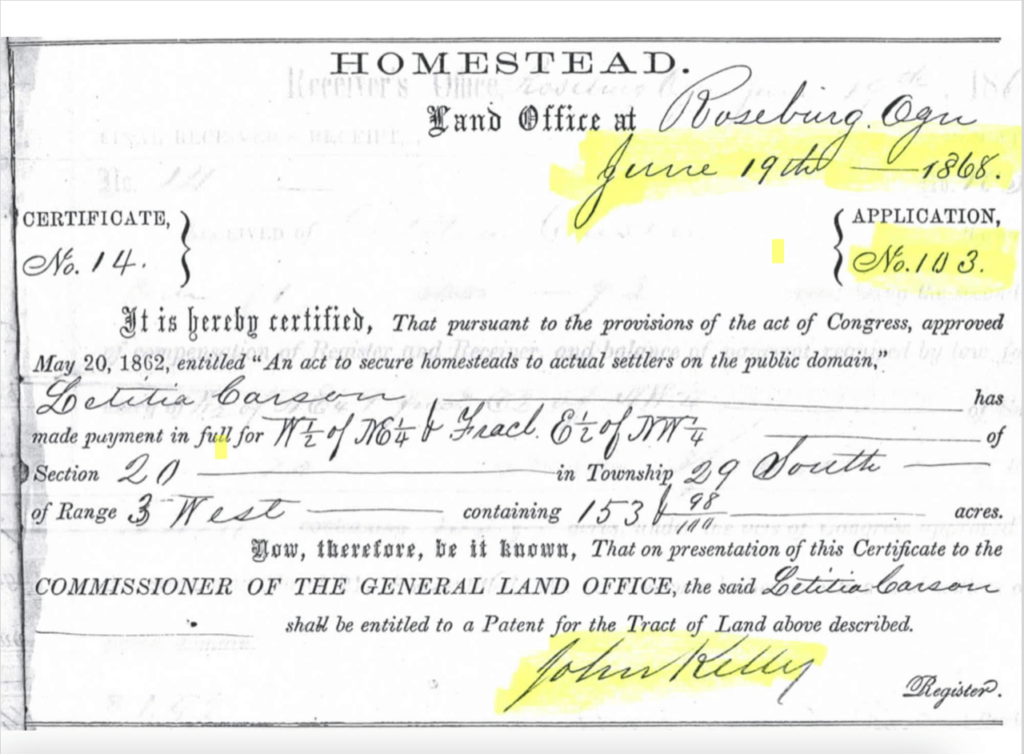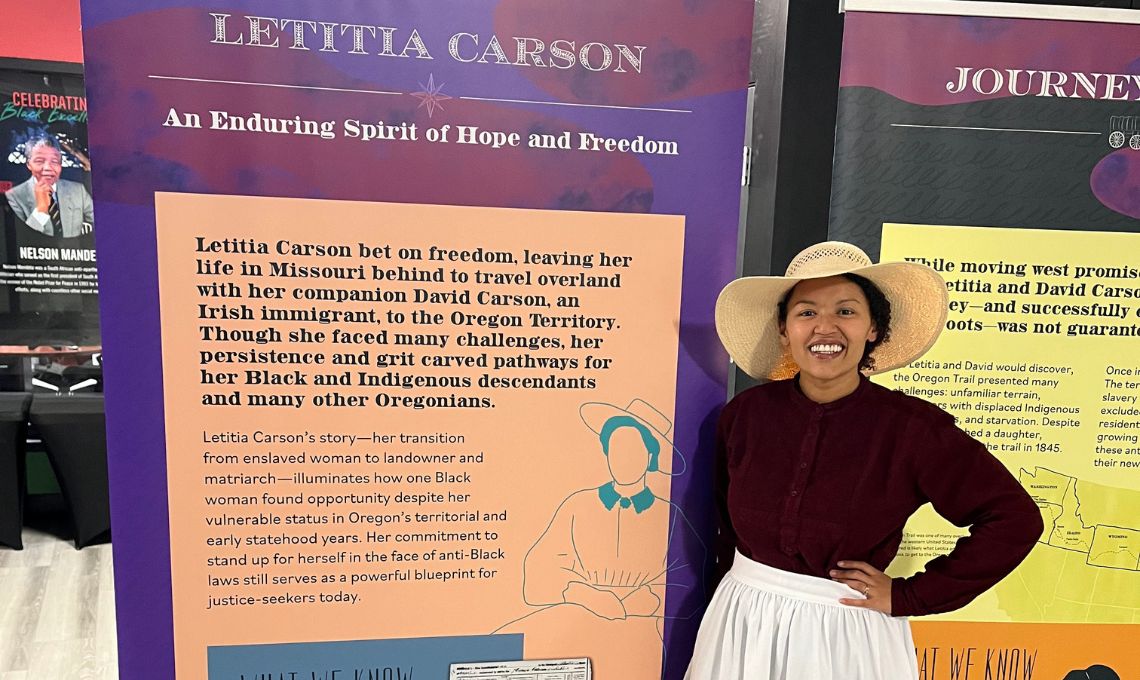Black settler Letitia Carson played pivotal role in Oregon pioneer history
The Roseburg audience for researcher Bob Zybach’s recent lecture on Black pioneer Letitia Carson kept streaming through the doors. Organizers for the event at the Douglas County Museum had expected 10-15 people. Instead, the room was at capacity, filled with historians, researchers, a Carson descendant, and nearly 65 Douglas County residents eager to learn more about their area’s unwritten history.
It’s a testament to the enduring legacy of Letitia Carson, a little-known historical figure who nevertheless played a pivotal role in Oregon’s pioneer history. Formerly enslaved, one of Carson’s most memorable claims to history is as an early Black homesteader in two Oregon locations. She also dared to sue a rich white neighbor in 1854 — and won. Her story is one of resilience, persistence and triumph over the marginalization and exclusion endemic in Oregon’s pioneer history.
The Ford Family Foundation is honored to provide support to Zybach and other efforts to bring Carson’s story to life. “The Foundation has a long history of investing in high-quality data and information related to rural Oregon and Siskiyou County, and storytelling is a big part of that work,” says Kasi Allen, the Foundation’s vice president of Learning and Impact. “Letitia Carson is one of those stories we hope can be told far and wide.”
Her story is also a reminder that history is largely written by those with influence and power. Carson, as a Black woman, had neither. “Women and illiterate people typically have been avoided in most of our recorded history,” Zybach says. “Letitia Carson lived about five incredible lives and then was largely forgotten.”
Forgotten, that is, until 1989, when Zybach found an intriguing reference to the estate of Letitia Carson’s partner, Irish immigrant David Carson, on an 1855 donation land claim map. Digging into David Carson’s life, Zybach found Letitia Carson’s name buried in the appendix of a book on the 1845 crossing. Curious about why Carson did not figure into her husband’s estate, he visited the Benton County Courthouse in search of old records. What he found was a treasure trove of untouched papers relating to David and Letitia Carson. “The estate papers were a revelation,” Zybach says. “There were 180 files, and no one had checked them out since 1857.”
Finding a home in Oregon
Carson’s place in recorded history begins in 1845, when a wagon train census described her as a member of the David Carson wagon. She was about 30 years old and pregnant, giving birth to daughter Martha on the Oregon Trail.
After the five-month crossing from Missouri, the couple staked a 640-acre provisional land claim on Soap Creek, near what is today Corvallis. Their son Adam was the first Black child born in Benton County. In 1850, their claim was reduced by half — to a single man’s allotment — most likely because they were not recognized as married.
Two years later, she was kicked off her land. David Carson died in 1852 without leaving a will, and the executor of the estate, a prominent neighbor, immediately evicted Carson and her children. At the time, Oregon’s exclusion laws forbid Black people from entering or living in the state, except for those already present, and also prevented them from owning land or filing lawsuits.
After the neighbor auctioned their belongings, including a herd of 29 cattle and the family Bible, Carson and her children were left with — literally — the clothes on their backs. The Benton County records showed that Carson managed to buy back some of her belongings, spending $104.87 to purchase her own cow, bed, washtub and frying pan.
Settling in Douglas County
The family traveled south to Douglas County, where Carson became well known as the community midwife, credited with delivering the first white child born in the Cow Creek Valley.
It was then that Carson took the unprecedented step of challenging her former neighbor for a fair share of the estate, filing two lawsuits, one for seven years of work and one asking for the value of livestock and other property. In a stunning victory, her Benton County “peers” — all of them white males — awarded her a total of $2,129, worth more than $77,000 today. Newspapers largely ignored the landmark case.

When the Oregon Homestead Act passed in 1863, Carson quickly moved to claim 160 acres near Myrtle Creek. She was one of the few women — and apparently the only Black woman — to receive land under the act.
When the Oregon Homestead Act passed in 1863, Carson quickly moved to claim 160 acres near Myrtle Creek. She was one of the few women — and apparently the only Black woman — to receive land under the act. Her claim was approved even though, as a Black woman, she did not qualify, raising the intriguing possibility that she had good friends at the courthouse.
Carson harvested apples and ran cattle on her 160-acre farm until her death in 1888.
There is little chance now that Carson’s story will again recede into dim history. Renewed efforts across the state have brought a flurry of attention to her life and legacy.
- In 2021, an elementary school near the Benton County land claim was renamed in her honor. Students at the Letitia Carson Elementary School in Corvallis go outside the traditional history books to learn about her role in Oregon history as a Black pioneer and a force for change. Students have produced a series of picture books.
- A traveling exhibit about Letitia Carson’s life has been making its way around Oregon. The exhibit, supported by The Ford Family Foundation and the Letitia Carson Legacy Project, is available for booking through its creators, Oregon Black Pioneers.
- As he works to make his research available to all, Zybach recently published his detailed Letitia Carson talk. “Hopefully this history can be used by students and teachers at Letitia Carson Elementary School as well as by other schools, distance learning projects, and anyone interested in her story,” Zybach says.
- The Letitia Carson Legacy Project (LCLP) has sponsored several events bringing her story to the public. The LCLP is a Black-led collaborative dedicated to commemorating Carson’s life, illuminating seldom-told aspects of Oregon’s history. The organization holds an annual symposium dedicated to Carson’s life, featuring new research, updates from LCLP project partners, and an afternoon field trip to the land claim and homestead site in Benton County. The LCLP also manages a digital history collection available to anyone interested in learning more.

Bob Zybach shares knowledge with a room filled with historians, researchers, a Carson descendant, and nearly 65 Douglas County residents eager to learn more about their area’s unwritten history. Credit: Dan Loomis.
Last summer, Zybach had the singular pleasure of watching his great-grandchildren play in the same swimming hole as Carson’s children more than 150 years ago. The get-together on the site of the Myrtle Creek homestead was hosted by the land’s current owners. “We are continuing to learn more and more about Letitia’s life, especially in Southern Oregon,” says Allen, who attended the gathering. “I think everyone in Oregon should know her story, which can help inspire action and change today.”

